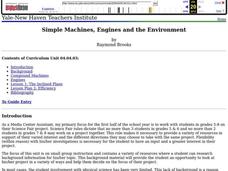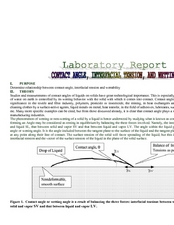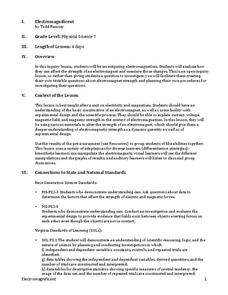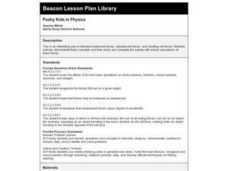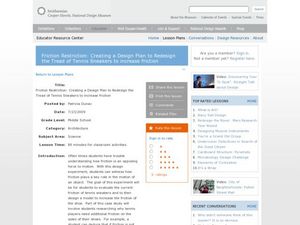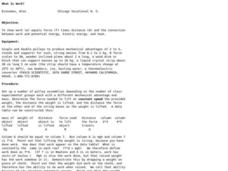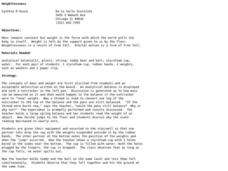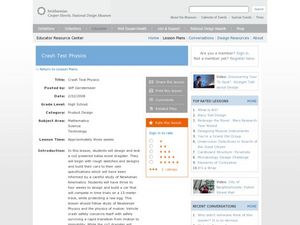Curated OER
Principles Of Flight: Wings That Spin
Students discover how flight is possible. In this physics instructional activity, students investigate the properties of a blimp and gyro-copter, comparing rotating wings and fixed wings of aircraft. Students create their own...
Curated OER
Simple Machines, Engines and the Environment
Fourth graders calculate the mechanical advantage of an inclined plane. In this physics lesson, 4th graders identify the different types of simple machines and their uses. They give examples of compound machines.
Curated OER
Ice Floats
Students explore the changing density of water. In this physics instructional activity, students investigate how an object's density determines whether it will float or sink in water. They explain why this unique property of is important...
Curated OER
Battery Charger
Students explain how battery chargers work. In this physics lesson, students discuss the two main ways that vehicles get charged. They build their own battery charger.
Curated OER
Trajectory and Range of a Projectile
Learners investigate the factors affecting projectile trajectory. In this physics lesson, students calculate the range, time and speed of projectiles using mathematical equations.
Curated OER
Thermo and Fluid Dynamics of a Homemade "Lava Lamp"
Students construct their own lava lamp using simple substances. In this physics lesson, students explain how difference in density causes convection. They solve for forces and buoyancy using mathematical equations.
Curated OER
Magnetorheological Fluids
Students conduct a series of experiments on magnetorheological fluids. In this physics lesson, students explain how these fluids behave in varying magnetic field strength. They give practical applications of magnetorheological fluids.
Curated OER
Contact Angle. Interfacial Tension and Wetting
Students determine the contact angle of water on different surfaces. In this physics lesson, students calculate their percent error using a mathematical formula. They explain the advantages of using non-wetting surface for certain...
STEM for Teachers
Electromagnificent
This physics pun really hertz, but this STEM lesson plan can help. The inquiry-based activity has young scientists create a testable question about electromagnetic strength; plan and implement their own experiments; and record and...
California Institute of Technology
Physics of Light
Gummy bears are tasty, but did you know they are also used to determine color and light properties? Use the activity as a way to demonstrate light absorption, light reflection, and refraction with high schooler....
Curated OER
Pushy Kids in Physics
Young scholars examine the concepts of balanced forces, unbalanced forces, and resulting net forces. They participate in a force and motion demonstration by pushing students in various directions, and calculating and identifying the...
Curated OER
Archimedes' Principle
Students examine the relationship between density and buoyancy. In this physics lesson students use Archimedes' Principle to complete calculations on buoyancy and a lab activity.
Curated OER
Friction Restriction: Creating a Design Plan to Redesign the Tread of Tennis Sneakers to Increase Friction
Students evaluate the friction of tennis sneakers and redesign them to increase friction. In this physics lesson, students calculate starting, sideways and forward stopping friction. Using quantitative data, they prove that redesigning...
Curated OER
Alka-Seltzer Rockets: How to Build Your Own Rocket
Students create a rocket using Alka-seltzer of baking soda and vinegar. In this physics lesson, students identify the factors affecting the length of time the rocket is propelled. They relate this activity to actual rocket launched in...
Curated OER
Physical Education - Gallop
Students practice galloping. In this gross motor skills activity, students review how to jump and hop using a jump-rope and hopscotch. The teacher shows the steps to gallop and they hold a noodle and pretend as if they are riding a...
Curated OER
What is Work?
Learners investigate the connection between work, potential energy, kinetic energy, and heat. In this physics lesson, students use pulleys to produce mechanical advantages and incline planes to demonstrate energy conversion.
Curated OER
A Guide (on the Side) to Physics
Students engage in a lesson that is concerned with the concepts related to the study of Physics. They participate in class discussion and list common misconceptions of Physics. Students write and discuss the problem of Science illiteracy.
Curated OER
Weightlessness
Students compare and contrast the terms "weight" and "mass". In this physics lesson, students observe an experiment in which objects are placed on a balance scale and weighed under different circumstances. Partners drop items and observe...
Curated OER
Pendulums
First-time physicists experiment with pendulums in this physics lesson. They vary the weight of the bob, record how long each takes to complete ten period swings, and then calculate the time for one period. They repeat the procedure,...
Curated OER
Wind Effects on Model Building: Lab for Deflection and Moment of Inertia
Students investigate the relationship between shape of object and moment of inertia. In this physics instructional activity, students collect data from the experiment and use spreadsheet to graph them. They discuss how load affects...
Curated OER
May the Force Be With You
Students read an article, brainstorm ideas and prepare journals investigating why people enjoy 'thrill' rides, what forces affect the body on these rides and how they can become dangerous.
Curated OER
Crash Test Physics
Young scholars design and test balsa cars. In this crash tet lesson, students design and build their own cars to specifications. They explore the physics of motion and vehicle crash safety.
Curated OER
"A Lesson Before Dying" by Ernest J. Gaines
An exploration of the book "A Lesson Before Dying" can lead students to discussions about the role of men in society.
Curated OER
Magdeburg Hemispheres
Students investigate whether air exerts a force. In this physics lesson, students calculate air pressure using force and area information.



